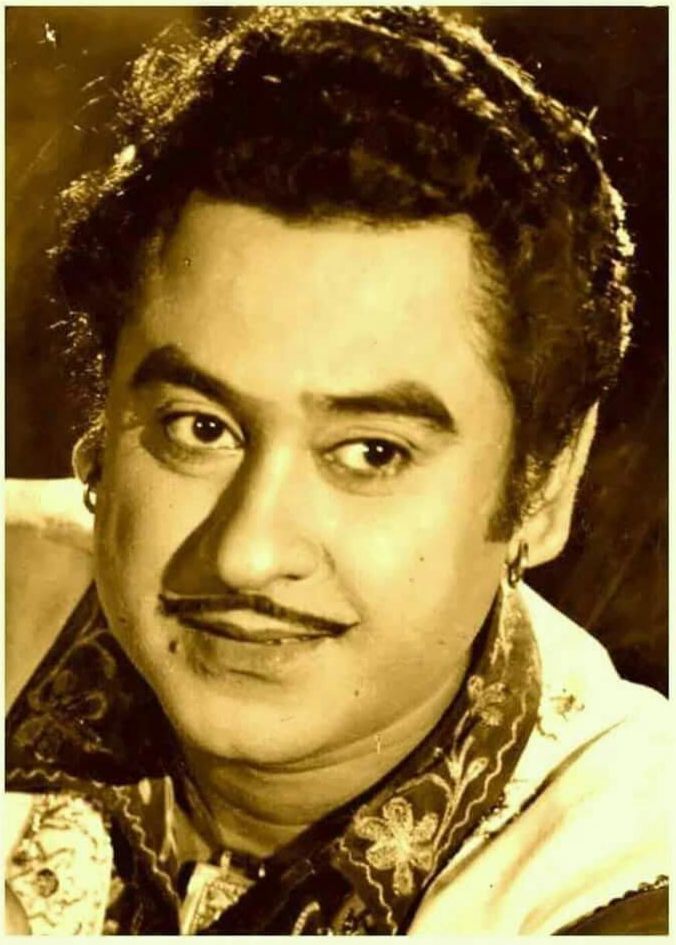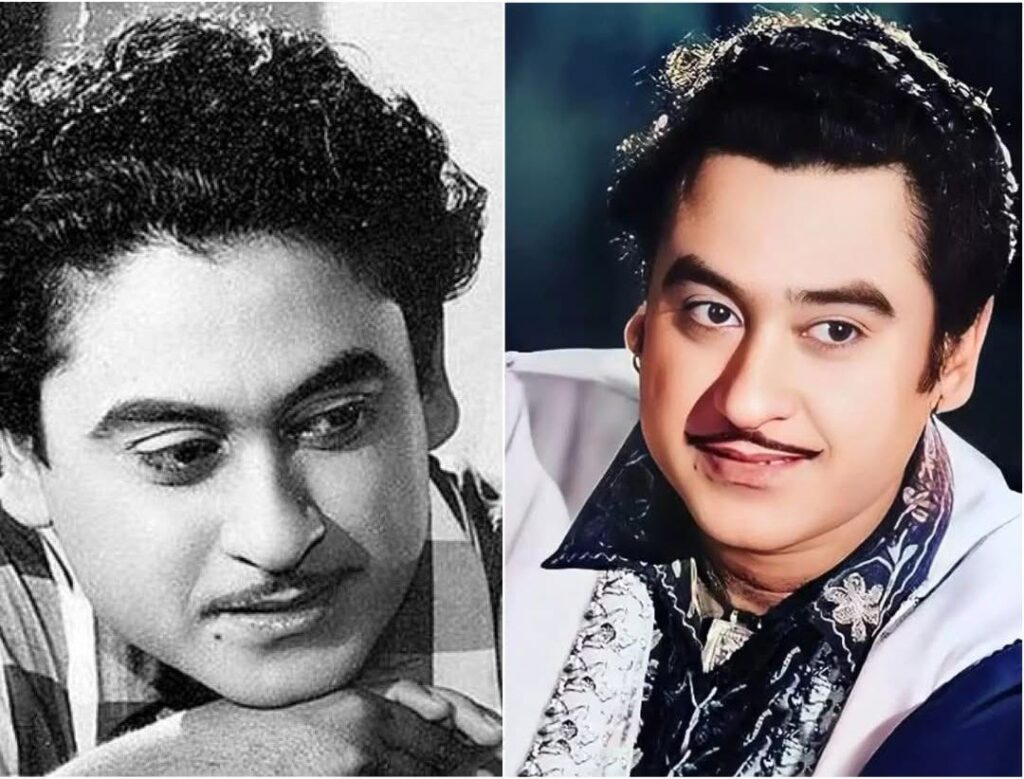
Kishore Kumar at 96: The Man, the Music, the Madness A tribute to the multifaceted genius who sang, acted, composed, directed, wrote, and lived on his own terms.
The Unmatched All-Rounder
On August 4, 2025, Kishore Kumar — born Abhas Kumar Ganguly — would have turned 96. For those who grew up on his voice, the date is a reminder of a man who could make you laugh with his antics, weep with his melodies, and marvel at his boundless versatility.
Kishore Kumar was not just a playback singer — though even in that role, he was arguably peerless. He was also a gifted actor, lyricist, composer, director, screenwriter, producer, and a maverick entertainer who defied every stereotype. To borrow from the film world’s overused phrase, he was “a complete package” — except with Kishore, the phrase was true in every sense.
Early Life: A Small-Town Boy with Big Dreams
Born in Khandwa, Madhya Pradesh, on August 4, 1929, to Kunjalal Ganguly, a lawyer, and Gouri Devi, from a wealthy Bengali family, Kishore was the youngest of four siblings — after Ashok Kumar, Sati Devi, and Anoop Kumar.
His eldest brother, Ashok Kumar, was already a matinee idol in Bombay when young Abhas arrived in the city. Bombay Talkies, where Ashok worked, was Kishore’s first brush with films. He began humbly as a chorus singer and later appeared briefly in Shikari (1946). In 1948, music director Khemchand Prakash gave him his first song, “Marne Ki Duayen Kyun Mangu,” for Ziddi. The song was well received, but Kishore was still unsure if cinema was his calling.
Actor First, Singer Forever

Ashok Kumar wanted his younger brother to follow his path as an actor. Between 1946 and 1955, Kishore appeared in 22 films, most of which flopped. Ever the reluctant actor, he sometimes sabotaged his own roles to escape contracts. But hits like Ladki (1953), Naukari (1954), Baap Re Baap (1955), and New Delhi (1957) changed his mind.
From 1955 to 1966, Kishore enjoyed a golden run as a comic and romantic lead. His pairing with Madhubala, Vyjayanthimala, Mala Sinha, and Nutan gave audiences some of the era’s most loved films. Chalti Ka Naam Gaadi (1958), his home production starring the three Ganguly brothers and Madhubala, remains a classic. In Half Ticket (1962), he sang both male and female parts for “Aake Seedhi Lagi Dil Pe,” showcasing his unmatched vocal range and comic timing.
The Voice of Generations
Even as he acted, Kishore’s singing career began to eclipse everything else. His breakthrough as a playback singer came in the late 1960s, particularly with the music of Aradhana (1969), where R.D. Burman and S.D. Burman tapped into his energetic, emotive style. Songs like “Mere Sapnon Ki Rani” and “Roop Tera Mastana” became instant classics.
Kishore’s voice became inseparable from Rajesh Khanna’s screen persona. Across 92 films, he sang 245 songs for Khanna — a record unmatched in Hindi cinema. He also lent his voice extensively to Amitabh Bachchan, Dev Anand, and Jeetendra, each time adapting his style to suit the actor’s screen image.
Hits That Refuse to Fade
The list of Kishore Kumar’s hits is practically the soundtrack of Hindi cinema’s golden era:
• “Pyaar Deewana Hota Hai” (Kati Patang)
• “Chingari Koi Bhadke” (Amar Prem)
• “O Mere Dil Ke Chain” (Mere Jeevan Saathi)
• “Pal Pal Dil Ke Paas” (Blackmail)
• “Zindagi Ka Safar” (Safar)
• “Rimjhim Gire Sawan” (Manzil)
• “Humne Tumse Pyar Kitna” (Kudrat)
And hundreds more, each distinct in mood and texture — from the flirtatious “Ek Ladki Bheegi Bhaagi Si” to the meditative “Woh Shaam Kuch Ajeeb Thi.”
The Maverick
Kishore Kumar’s eccentricities were legendary. He was notorious for refusing to work without advance payment. If underpaid, he might show up with makeup on only half his face, saying, “Aadha paisa to aadha makeup.” Once, when owed money by producer R.C. Talwar, he appeared at Talwar’s house every morning shouting, “De de mere aath hazaar,” until he was paid.
During the Emergency (1975–77), he famously refused to sing for a Congress rally. The government responded by unofficially banning his songs on All India Radio and Doordarshan — but his popularity only grew.
Behind the Eccentricity, a Generous Heart
For all his quirks, Kishore could be generous to a fault. He recorded songs free for friends like Rajesh Khanna and Danny Denzongpa, and even lent money to struggling colleagues. He regularly sent financial help to the family of Arun Kumar Mukherjee, the man who first recognized his singing talent.
The Man and His Loves
Kishore’s personal life was as eventful as his career. He married four times:
1. Ruma Guha Thakurta (1950–1958), with whom he had his son Amit Kumar.
2. Madhubala (1960–1969), a love story shadowed by her illness and his conversion to Islam (as Karim Abdul) for their civil wedding.
3. Yogeeta Bali (1976–1978).
4. Leena Chandavarkar (1980–1987), with whom he had his younger son, Sumit Kumar.
Beyond the Microphone
Kishore Kumar was not content to just sing. He wrote stories, composed music, edited films, and directed offbeat projects like Door Gagan Ki Chhaon Mein (1964), in which he also played the lead. His creative curiosity had no limits — and neither did his resistance to being typecast.
Awards, Recognition, and Legacy
Kishore won eight Filmfare Awards for Best Male Playback Singer — the most by any male artist in the category. In 1985–86, the Madhya Pradesh government honored him with the Lata Mangeshkar Award. After his death, the state instituted the Kishore Kumar Award for contributions to Hindi cinema.
He died suddenly on October 13, 1987, at age 58, leaving behind an unmatched musical legacy. Decades later, his voice continues to dominate playlists, cover versions, and reality show tributes.
Why Kishore Kumar Still Matters
In an age of auto-tuning and formulaic entertainment, Kishore’s work reminds us of a time when artistry came with personality. He was never just a singer reading notes from a sheet; he lived inside his songs, adding sighs, chuckles, and quirks that made them immortal.
He could be romantic without being syrupy, melancholic without being morose, and funny without being forced. And always — always — unmistakably himself.
A Voice That Refuses to Die
As we mark Kishore Kumar’s 96th birth anniversary, his songs still spill out of roadside tea shops, car stereos, and streaming apps. They accompany train journeys, wedding dances, heartbreaks, and lazy Sunday afternoons. His music, like his spirit, refuses to fade.
Kishore once said, “Main pagal hoon, pagal hi rehna pasand karta hoon” (“I am crazy, and I like staying that way”). Perhaps that “craziness” — his refusal to conform, his insistence on joy in creation — is what keeps his art fresh, long after the man himself has gone.
Hasnain Naqvi is a former member of the history faculty at St. Xavier’s College, Mumbai





